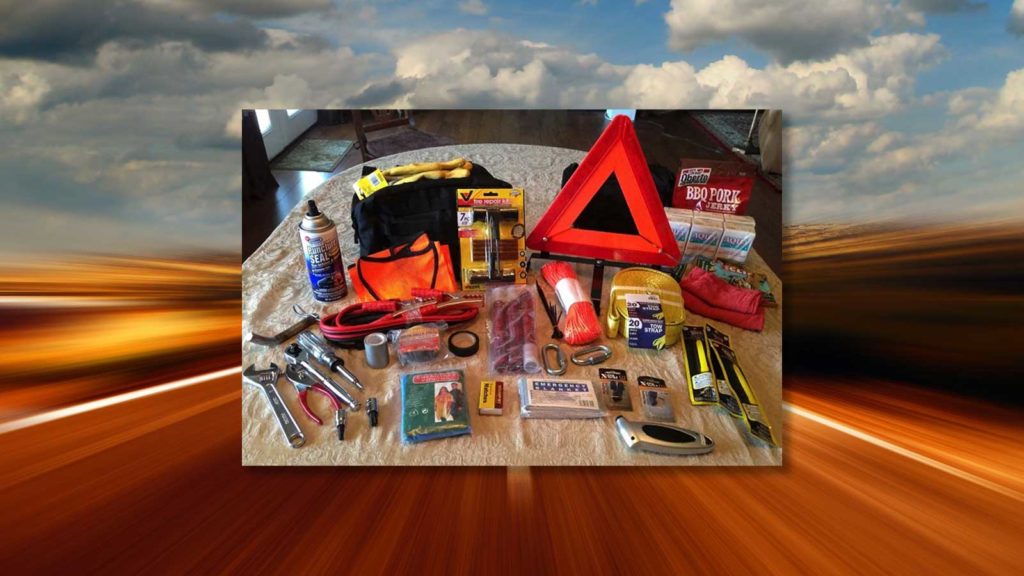Heading out on a long road trip? Be sure to assemble these items in case of an emergency. (Keep in mind this list may be different depending on the season and/or your destination.)
- Roadside assistance contact info: If you have emergency roadside assistance through an insurance company make sure to have your membership card and/or their phone number.
- Cell phone and car charger: Yes, we know; you don’t go anywhere without your phone. Just remember that, on the road, it may be hours before you can plug into a wall socket. A car charger can help ensure your phone will never be without ample battery life.
- First aid kit: Purchase one that can assist with both small cuts, bruises or stings to larger issues like burns and major bandages. Use an internet search engine or visit a box store and you will find many first aid kit options.
- Fire extinguisher: Multipurpose dry chemical extinguishers are available in compact sizes.
- Warning light, hazard triangles and flares: When stuck on the side of the road, it is imperative that other vehicles are able to see you — especially at night. An easy, cheap option are glow sticks found at dollar stores.
- Tire gauge and portable air compressor: Tire pressure changes depending on the ambient air temperature. Check your pressure before and throughout your trip. Consult your vehicle’s owners manual for your specific ranges. Don’t forget to check the spare. The air compressor can plug into your charge port and can quickly top off a low tire.
- Car jack and lug wrench: You will need these in case you have to change a tire. New cars come with these, but they are sometimes missing if you buy used. Also, the car jacks and lug wrenches that come with some vehicles aren’t always the best or easiest to use. Consider upgrading to a compact floor jack and crisscross lug wrench. Also, don’t leave home without making sure your spare tire is fully inflated.
- Jumper cables or portable jump starter (battery booster): A portable battery booster allows you to jump start your vehicle when there is no one else around. These cost around a hundred dollars and are worth the investment. Remember to bring the instructions with you.
- Spare fuses: Check your owner’s manual for the types of fuses your car uses and the location of the fuse box: or stop in and we can show you. Small electrical problems are easy to fix if you have these inexpensive fuses with you.
- Flashlight and spare batteries: Think about getting one that is hands-free, either a head light or one with magnets. Stick with LED models. The batteries will last longer and you won’t have to worry about replacement bulbs.
- Gloves, hand cleaner and towels or rags: Working on cars can get messy. When prepared you can drive away without grease getting everywhere inside your vehicle.
- Small bills and change: You may need cash or coins for anything from tolls to vending machines. Don’t assume all shops and restaurants accept credit cards — especially in small towns. Having as much as two hundred dollars in small bills and change would not be overdoing it.
- Small cooler with water and snacks: If traveling with pets remember some for them and a bowl or two.
- Umbrella and/or rain poncho: Umbrellas not only keep you out of the rain but can also shade you from the sun. A rain poncho will allow you to work on your car with both hands.
- Walking shoes: Going on a beach trip and plan on wearing only flip flops? You may end up having to walk a mile or more to get help. Throw a pair of sneakers in your trunk.
- Spare keys: Getting locked out of your vehicle or losing your keys will quickly ruin your trip. Remember that most newer vehicles require a special transponder key.
- Travel plan: This is the road trip equivalent of filing a flight plan. Be sure a friend or family member knows where you are going, how you plan to get there and when you plan to arrive. This is especially important if it is your children who will be traveling on their own.
- Tools: Put together a small tool box with items such as an adjustable wrench, Phillips and flat screwdrivers, vice grips, duct tape and rope. Remember that you can buy basic tool kits with most of these items and more at your local home center.
Save time and money
If your time is worth money and you would rather purchase an already assembled emergency kit, you can find them at any of a variety of box stores. Or just Google Emergency Car Kit. You will find many versions for sale on line.


